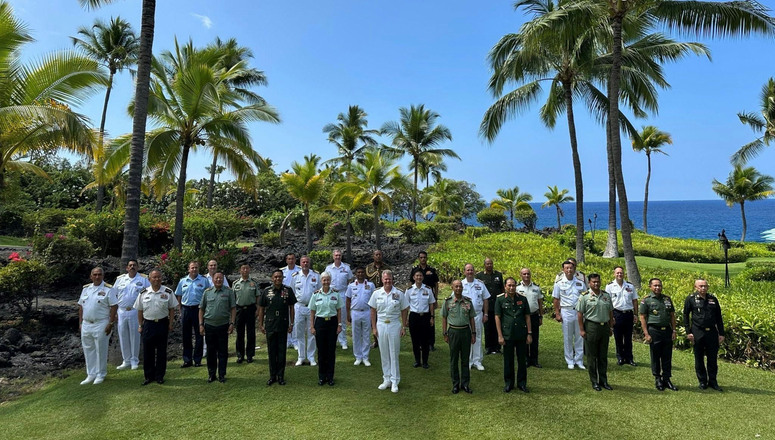From 18 to 20 September 2024, Admiral Rob Bauer, Chair of the NATO Military Committee attended the 26th annual Indo-Pacific Chiefs of Defence Conference in Kona, Hawaii. This year's theme was "The Future Indo-Pacific: Building a Resilient and Interconnected Region." Admiral Bauer attended at the invitation of Admiral Samuel Paparo, Commander of the United States Indo-Pacific Command. On the side-lines of the conference, Admiral Bauer met with Chiefs of Defence from Partner nations Australia, New Zealand and Japan.

The conference allowed senior military leaders from 28 countries and multilateral entities to discuss topics such cybersecurity, regional capacity building, threats and opportunities in emerging technologies and the future of the Indo-Pacific. The purpose of the conference was to build on and strengthen relationships, thereby enhancing mutual understanding, cooperation and a consistent operational framework, while underscoring international commitment to protecting shared interests across the Indo-Pacific.
"The Indo-Pacific is important for NATO because developments in this region can directly affect Euro-Atlantic security," said Admiral Rob Bauer. "The Alliance is strengthening its dialogue and cooperation with Partners in the Indo-Pacific. It was important to meet our Partners and also share NATO's views with other participants in the INDOPACOM, addressing cross-cutting security issues and global challenges," the Chair of the NATO Military Committee added.
Discussions in the meeting with Admiral Samuel Paparo, Commander of the United States Indo-Pacific Command, focused on the evolving security challenges in the region and how to maintain global stability and security. The two Admirals discussed China's military build-up, the threat from North-Korea and the global implications of the war in Ukraine.
In his meetings with Chiefs of Defence from Australia, New Zealand and Japan, Admiral Bauer highlighted the steps taken at the Washington Summit in July to further enhance practical cooperation between NATO Allies and their Indo-Pacific Partners. This includes launching new cooperative flagship projects in the areas of supporting Ukraine cyber defence, countering disinformation, and technology such as artificial intelligence.
While sitting down with Admiral David Johnston, Chief of Defence of Australia, Admiral Bauer highlighted the crucial role Australia plays in the Indo-Pacific. They also discussed Partnership, Allied activities in the region and related STRATCOM, the war in Ukraine, defence production capacity, digital transformation and Multi Domain Operations.
Admiral Bauer also spoke about Indo-Pacific security with Air Marshal Tony Davies, Chief of Defence of New Zealand. The two underlined the paramount importance of upholding the rules-based international order and supporting Ukraine in its legal right to self-defence.
In the meeting with General Yoshihide Yoshida, Japan's Chief of Defence, Admiral Bauer underscored the importance of NATO's and Japan's partnership in maintaining Indo-Pacific security. General Yoshida highlighted the positive effects of activities by individual Allies in the region. Another main topic was the war in Ukraine and China's role as a decisive enabler of Russia's war efforts.
"In this dangerous world, partnerships are more important than ever. Security is global, not regional. European security is interlinked with security in the Indo-Pacific," said Admiral Bauer. "Attending the Indo-Pacific Chiefs of Defence Conference reaffirmed that NATO's Partnerships remain key to enhancing stability, positively influencing the global security environment, and upholding international law."






